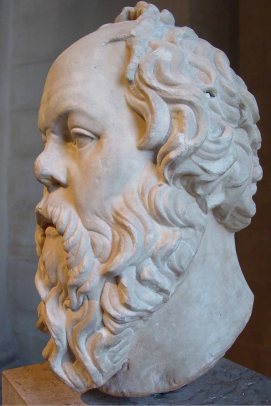In “Evolution Explains It All for You,” Galen Strawson considers Daniel Dennett’s arguments for compatibilism, the idea that “freedom is wholly compatible with determinism, although determinism is the view that everything that happens in the universe is necessitated by what has already happened, so that nothing can ever occur otherwise than it actually does.” Yet, Strawson says, “This compatibilist freedom … seems intensely unsatisfactory. “
oldie but goodie
A homepage for philosophy
What’s the difference between Wikipedia and the Stanford Encyclopedia of Philosophy (SEP)? SEP is “peer-reviewed, respected, accurate, and free.” It’s a terrific resource for “stressed undergraduates cramming before exams, professors looking for a topical refresher, or ‘regular’ people who are just interested in philosophy.”
The Socrates we don’t know
Adam Kirsch uses Plato, Xenophon, and Aristophanes to “to triangulate the greatest man of antiquity — Socrates himself” … and also to reflect on how much we can know at all.
A marriage devoted to the mind-body problem
Two heads … a very interesting profile of Paul and Patricia Churchland, the mind-body problem generally, and the revolutionary neuroscience they dream of …
Paul and Pat, realizing that the revolutionary neuroscience they dream of is still in its infancy, are nonetheless already preparing themselves for this future, making the appropriate adjustments in their everyday conversation. One afternoon recently, Paul says, he was home making dinner when Pat burst in the door, having come straight from a frustrating faculty meeting. “She said, ‘Paul, don’t speak to me, my serotonin levels have hit bottom, my brain is awash in glucocorticoids, my blood vessels are full of adrenaline, and if it weren’t for my endogenous opiates I’d have driven the car into a tree on the way home. My dopamine levels need lifting. Pour me a Chardonnay, and I’ll be down in a minute.’ ”
(Until July 21, only subscribers had access to this article on The New Yorker‘s website. It may go back behind the paywall when the magazine sets up a “metered paywall” in Fall 2014.)
Anorexia, brain activity, and hormones in the womb.
Anorexia visible with brain scans and womb hormones ‘lead to anorexia’. These two articles are of interest with respect to the mind-body problem and the question of how much is up to you. Are the brains of persons with eating disorders different because they have eating disorders, or do they have eating disorders because their brains are different? Or is this a confused question because there is only the brain? And is your brain programmed in the womb?
Does it matter if your professor grades your paper when tired or hungry?
What if your professor suffers from decision fatigue? What if you do? Nice review by John Tierney of psychology studies on decision-making and self-control. “Decision fatigue is the newest discovery involving a phenomenon called ego depletion, a term coined by [FSU psychology professor] Roy F. Baumeister in homage to a Freudian hypothesis. Freud speculated that the self, or ego, depended on mental activities involving the transfer of energy. … Freud’s energy model of the self was generally ignored until the end of the century, when Baumeister began studying mental discipline in a series of experiments, first at Case Western and then at Florida State University. These experiments demonstrated that there is a finite store of mental energy for exerting self-control. … Willpower turned out to be more than a folk concept or a metaphor. It really was a form of mental energy that could be exhausted.” More here.
Do you have free will? You’d better believe it
Do you have free will? It’s the only choice. Nice review by John Tierney of ideas about free will.
How do philosophers’ and scientists’ theories about free will line up with what people actually think about it? “Intellectual concepts of free will can vary enormously, but there seems to be a fairly universal gut belief in the concept starting at a young age. … Whatever their cultural differences, people tend to reject the notion that they live in a deterministic world without free will.”
Does it make any practical difference whether you believe you have free will? We “pragmatically intuit that regardless of whether free will exists, our society depends on everyone’s believing it does. The benefits of this belief have been demonstrated in other research showing that when people doubt free will, they do worse at their jobs and are less honest.”
Dualism, physicalism, and health
I think therefore I exercise. Do you believe you are two different kinds of things (an immaterial mind and a material body), or do you believe that the mind is not an immaterial substance that is different from the physical world? It turns out that your belief one way or the other might have any important real-world consequences on your health.
Descartes, Aristotle, and Terri Schiavo
Did Descartes doom Terri Schiavo? “The plea … to prolong Ms. Schiavo’s feeding, against the wishes of her husband or what courts determined to be her own expressed inclinations, echoed the teachings of Aristotle, who considered existence itself to be inviolable. On the other side, the argument that Ms. Schiavo’s life could be judged as not worth living echoed Descartes, the Enlightenment philosopher who defined human life not as biological existence – which might be an inviolable gift from God – but as consciousness, about which people can make judgments.”
Can ancient philosophy help people lead better lives?
Five books on ancient philosophy and modern life. Jules Evans “explores philosophy lessons of the ancients relevant to our globalised, information age – by way of cognitive behavioural therapy, and government measures of happiness.”
